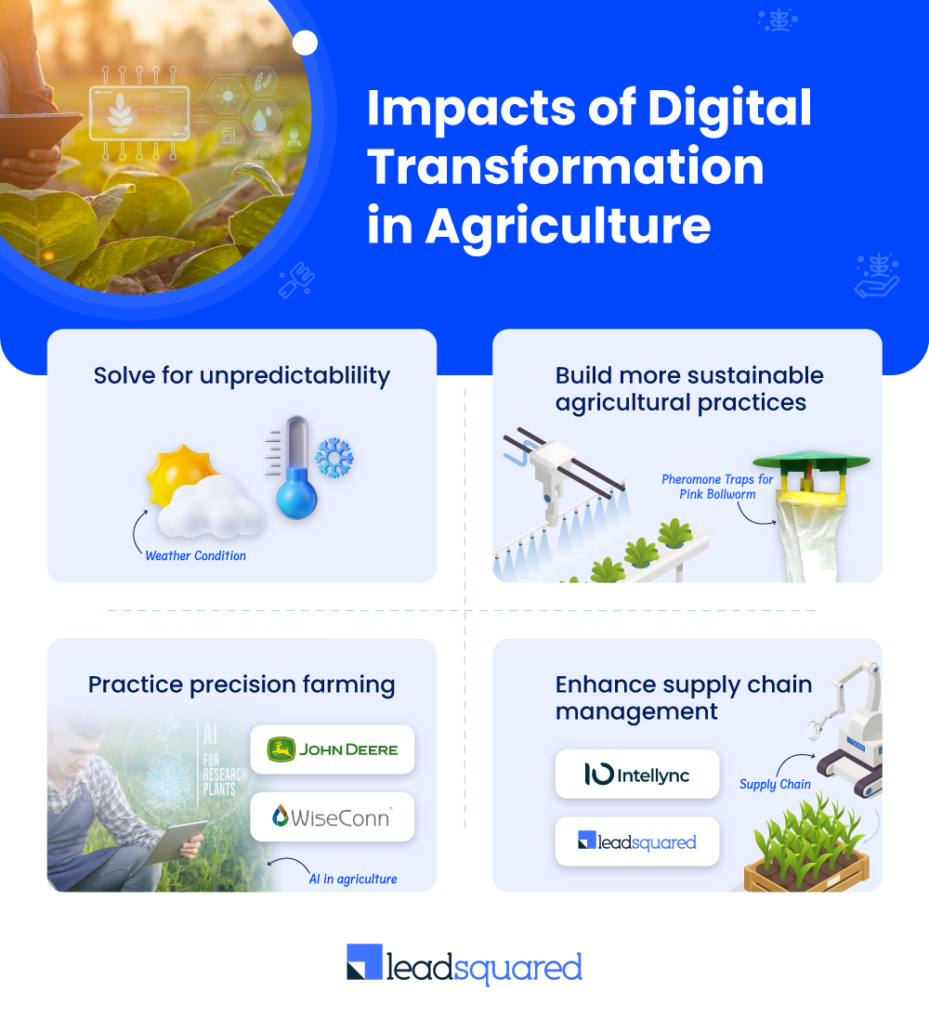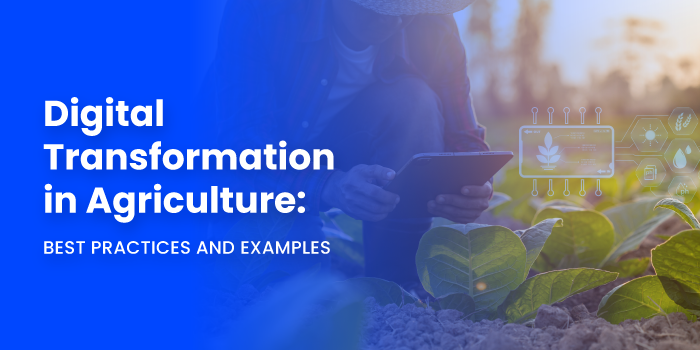We have seen a lot of industries in India transform over the years. But when it comes to digital transformation in agriculture, we haven’t even scratched the surface yet. From using AI and robotics for efficient harvesting to using satellites and drones to map out weather patterns—the West has already started implementing these.
In an interview with Ashok Dalwai, an agricultural economist, he shared how India is ready for an “income revolution”. The revolution, enabled by digital transformation, can help agriculture businesses capture the entire value chain right from research up to the stage where the farmers can realize money in their pockets.
In this article, we will share how technology will shape the future of agriculture produce and streamline the supply chain process.
What is Digital Transformation in Agriculture?
Digital transformation in agriculture can accelerate and improve various aspects—from collecting data from fields to helping the produce reach the market. It also helps farmers utilize geographic data to increase yield and automate manual tasks such as harvesting, sowing seeds, etc., using machinery.
Technology in agriculture is not only being used to boost production, but it improves supply chain management as well. Like setting up a direct marketplace to sell the produce and eliminate middlemen or having a platform to predict seasonal changes in demand.
From the commerce perspective, an agritech business needs to manage several tasks, teams, processes, and stakeholders to provide seamless customer and producer experiences. Digital transformation enables businesses to expedite communication and transactions by connecting the farmers, dealers, and distributors on a centralized platform.

Here’s how tools, such as an Agriculture CRM, can handle these tasks for businesses:
- Simplify the onboarding process for farmers, dealers, and distributors.
- Update communication and meeting status, even without a stable internet connection.
- Capture leads and prospects from multiple channels—online and offline.
- Manage and track conversations, performance, trends, and predictions.
It isn’t easy to streamline processes when the sector is unorganized, stakeholders are widespread, and technology adoption is limited.
But let’s look at why it is necessary to transform agricultural processes and the impacts it would create.
Impacts of Digital Transformation in Agriculture
The agriculture industry is predominantly driven by weather conditions and the availability of labor and resources. A majority of these aspects are unpredictable and not easy to monitor or control. But digital transformation can combat these challenges and impact the industry in a few ways:

1. Solve for Unpredictability
This unpredictability can be in the form of weather, yield, or demand patterns. Farmers in India are more reactive to market sentiments or yield output. By collecting data around market demand, weather patterns, and other trends—they will be able to build a more proactive approach to production.
It will help the stakeholders be better prepared:
- For market demand for the produce
- To optimize planting strategies – what to sow, when, and how to improve yield
- To align the production and distribution
- To enhance economic stability
2. Build More Sustainable Agricultural Practices
Agriculture is extremely dependent on natural resources which makes it difficult to meet the rising demand to support the growing population. It gave birth to unsustainable practices like over-fertilization, over-irrigation, soil degradation, and more.
With the advent of technology, farmers can employ more sustainable practices like smart irrigation, monitoring soil health, and using drones and AI to capture data on the health of the produce.
One such example of using sustainable practices is using pheromone traps for pink bollworm that feed on the cotton crop. It was observed that they were becoming genetically resistant to fertilizers and a non-pesticide approach helped them preserve the crop’s condition.
3. Practice Precision Farming
Whether it is understanding planting patterns, or optimizing production, technology helps farmers adopt more precise techniques. The role of AI in agriculture is still in its exploratory stage but is still making huge headway in the West.
In an article by Henry Gordon-Smith, a pioneer in agriculture technology, he shared how companies are moving towards more efficient farming practices. For example, John Deere, an agri-tech machinery manufacturing, is helping farmers improve productivity by 15% using their autonomous machinery.
WiseConn’s DropControl system has resulted in a 30% reduction in water usage thus reducing water wastage and avoiding over-irrigation in farmlands.
4. Enhance Supply Chain Management
Right from helping the produce reach the end-consumer faster to setting up organized processes to improve productivity, technology can enable effective supply chain management in agriculture.
CRMs like LeadSquared, bring together communication and tracking on one platform for all the stakeholders involved in the process, from production to distribution. Data intelligence companies like Intellync, provide analytics for all processes involved in the agriculture business.
We’ve seen the impacts of adopting technology in agriculture, but let’s look at what the world’s largest population economy is doing to adapt to these new practices.
India’s Take on Technology in Agriculture
Agriculture has been the backbone India’s economy since before Independence. The diverse climate conditions, different soils and terrains, and a huge population aided the sector to flourish. But in the recent years, the weather conditions have changed, unsustainable practices have emerged, and the government is looking at some serious legislative changes.
Let us look at a few examples of how India and Indians are adopting technology to improve agricultural practices.
1. Cost-effective Energy Solutions in Agriculture
Vidyut Mohan, the CEO of Takachar, is working on a breakthrough technology to convert natural waste into bioproducts to reduce the impacts of climate change and its effects on farming.
The inspiration to build this solution came from the bad air quality in and around Delhi, the city he grew up in. Burning of agricultural waste was one of the reasons of the reduced air quality in the NCR region, especially during winters.
Vidyut and his co-founder Kevin are working on a machinery that helps farmers turn waste into biofuels, fertilizers, and other products that can be used at a fraction of the current cost.
2. Building Resources and Educating Farmers
Vandana Shiva is an environmental activist, an author, and a food sovereignty advocate. She has spent her time educating farmers on maintaining biodiversity, growing native seeds, and organic farming practices.
She leads the Navdanya International, a national movement to promote the diversity of living resources. The initiative established over 40 seed banks across India to provide regional opportunity for diverse agriculture.
3. Innovative Irrigation Solutions
Ankit Chandra, an agritech enthusiast, shared the overview of the landscape of irrigation and water solution start-ups emerging in India. The reason why there are so many emerging start-ups in this sector is because more than half of the ground water is being used for irrigation.
Businesses are working to understand how these resources should be utilised—employ better water management practices, leverage resources, and help different stakeholders involved.
Some of the technology innovations he mentioned included automated irrigation controls, water flow measurement devices, satellite data, sensors, and IoT devices to measure crop water requirements and schedule irrigation. Pioneer companies from India include – GramworkX, NEERX, Kisan Raja – IoT for Agriculture, and Fasal.
Business innovations that solve challenges with irrigation include water delivery services and not just businesses that sell irrigation machinery to farmers. Examples include Oorja Development Solutions Limited, Naireeta Services Private Limited (Bhungroo), AgriRain, Claro Energy, Khethworks, and ONergy Solar. These companies focus on how technology can be provided at economized rates and reach poor and energy deficit regions in India.
4. AI-adoption to Improve the Value Chain
The World Economic Forum (WEF) in collaboration with the Telegana government has introduced an AI for Agriculture Innovation initiative across the state to help 7000 chilli farmers. The WEF described this project as an example of agriculture value chain transformation. It focuses on agritech services delivery to the end customer through administrative support and digital public infrastructure.
The impact includes:
- 9% increase in Agri Exports
- Better food security
- Promotion of sustainable agricultural practices
The initiative aims to scale its services of market intelligence and data-driven crop-advisories to 100000 farmers by 2025.
5. Growing Agtech Ecosystem in India
India’s ability to propel 50% more contribution to its GDP by 2030, is a dream that can be realized with the help of technology. The Agtech ecosystem in India has grown from 50 start-ups to 1000 start-ups between 2013 and 2020.
Agtechs can help farmers to increase their incomes by 25% to 35%, if adopted to its full potential. For example, UPL, an agrochemical company, is using technology to sell via direct-to-farmer channels that bypass middlemen and retailers.
Financial efficiency and ready availability of funds are another aspect to focus on to reduce loan risks for farmers. SBI has deployed the YONO Krishi App to understand and pitch the right financial products to farmers.
Firms that operate in procurement, processing, or the selling of agricultural products have started to create market linkages for the farmer. ITC, a core outputs player, has used its e-Choupal network to expand direct-from-farm procurement over the past 20 years.
And there are more examples than we can list. Whether it is using renewable energy, making data-driven decisions, or improving efficiencies in supply chain—India has been moving stealthily towards greener pastures.
Let us hear one such inspiring story from Fasal, who has used LeadSquared to achieve transparency in its sales funnel.
Fasal – How is it Transforming Agriculture with LeadSquared
Fasal is a one-stop platform for horticulture farming. In 2018, the journey started with a four-member team, and now they are on their way to impact Indian Agriculture. Since its inception, Fasal has helped numerous farmers achieve high earnings by enabling them to produce more and sell better.
Their AI-powered platform delivers farms, crops, and stage-specific actionable advisory for horticulture. It currently operates pan India. The team travels to remote places to connect with and onboard farmers and dealers.
They were looking for a single solution to capture leads from multiple sources, track activities of their field teams, and build an overall visibility of their sales pipeline.
They found the perfect solution in LeadSquared’s Agriculture CRM.
By partnering with LeadSquared, they achieved results like:
- Improved lead onboarding
- Better sales funnel visibility
- End-to-end lead management
Check out the full story here:
Wrap up
With changing times and testing conditions, the field of agriculture and the stakeholders involved need to take drastic measures in terms of
- Achieving better farm productivity
- Faster farm-to-market time
- Quicker financial disbursal and support
Digital transformation in agriculture has started taking its shape. But it is far from becoming a norm and standard practice. I hope these stories and opportunities have inspired you to bring a technological transformation for your own agriculture business.
If you are looking for an end-to-end sales management platform that can be customised to your business’ requirements, check out LeadSquared’s Agriculture CRM.
FAQs
Digital transformation in agriculture includes examples like:
1. Introducing natural pesticides, Smart Irrigation systems like Fasal, GramWorkX
2. Unified payment and financial solutions like Krishi App by SBI
3. Centralized communication with Agriculture CRMs like LeadSquared
Agriculture businesses have multiple stakeholders like farmers, dealers, and distributors. It requires constant communication, onboarding, as well as nurturing to build better relationships. An agriculture CRM like LeadSquared will help you keep a centralized process of communication across these different stakeholders.









